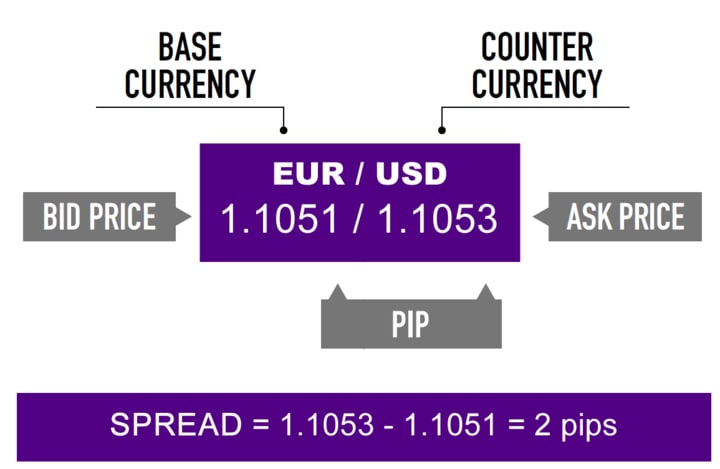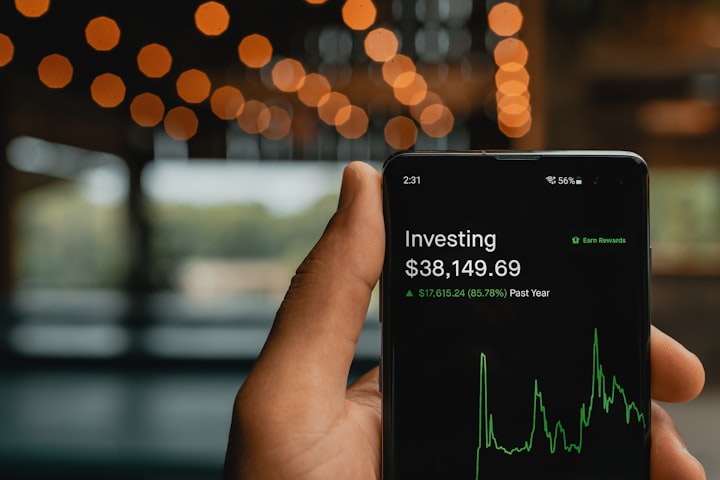The Spread In Forex: For Dummies
What is the spread in forex? In its simplest form, it's the primary trading cost for forex traders, but there’s more to it than meets the eye.
In forex, we have multiple liquidity providers in ECNs or electronic communications networks dealing with each other. These groups have trillions of tradeable currencies moving between financial companies; forex brokers are part of such institutions.
When clients wish to trade a particular currency pair or market, their broker places the order and finds a liquidity provider to fill that position. For their efforts, brokers apply a mark-up between the prices received from the providers and the price a trader eventually trades.
So, how does the spread work?
Let’s look at a simple example. If a trader wished to buy EUR/USD, they would receive a quote similar to the image below from their broker.

In Forex, we measure price increments and decrements in what is known as pips (percentage in points). In most cases, it's the change in a pair's fourth or fifth decimal - but in JPY pairs, it's the second.
If they decided to go long at 1.1051 (the bid or buying price), their eventual order would execute at 1.1053 on their platform because of the two-pip spread.
On the other hand, if they wished to go short at 1.1053 (the ask or selling price), their final order would fill at 1.1051 on their platform due to the same cost.
Hence, we often refer to the spread as the difference between the bid and ask price. It's the primary trading cost any trader will encounter, occurring on every position (even when opened for a second).
The spread is the cheapest in the most-speculated markets, namely the major pairs (EUR/USD, USD/CHF, AUD/USD, etc.)
Once we move from this to the minor or cross pairs (GBP/CAD, CAD/CHF, EUR/NZD, etc.), this slightly increases and then becomes more pronounced in thinly-traded instruments, which are exotics pairs (USD/ZAR, EUR/NOK, GBP/ZAR, etc.)
Variable and fixed spreads
In forex, we have two types of spreads; variable or floating and fixed.
Variable spreads
As the term suggests, a variable spread changes per market conditions. For instance, it will widen slightly above its expected range during busy periods with higher volatility because of the increased trading activity.
Just as prices of an e-hailing service like Uber increase with more demand, the same applies to spreads. The variable model is typical with most forex brokers and is generally seen as more transparent since it reflects natural market conditions from the recognized currency providers.
Even so, it isn’t recommendable for every trader because of the unpredictability of being variable. Scalpers and day traders generally don’t prefer these spreads because they can widen when most busy executing, increasing the chances of slippage.
Fixed spreads
Again, as the name suggests, this remains relatively constant even when it should vary. A broker achieves this ability by ‘market making’, not sending their clients’ orders to external providers.
In other words, they provide the liquidity themselves directly from what is known as a dealing desk, an in-house facility. With this model, it is the only way for them to provide fixed spreads, which offers the advantage of more predictable costs most of the time.
In most cases, fixed spreads are cheaper on a trade-by-trade basis. However, unlike variable ones, a commission is applied for every round turn, i.e., for opening and closing a position.
Therefore, they might not necessarily be cheaper, in the long run, depending on the commission rate, one’s trading frequency, and the markets they trade.
How does the spread affect on a day-to-day basis?
It is a big deal as the primary trading cost for any trader in the markets. Fortunately, the issue isn’t so much that we see brokers offering high spreads in most cases, at least for major and minor pairs. Brokers have become much more competitive in recent years.
More considerable is someone’s trading style and the markets they trade. The higher one’s trading frequency is, the more they will pay in spreads. Such costs can dent their gains if their profits are not marginally greater than their risk.
For instance, scalpers and, to some extent, day traders aim for small targets or pips. We can typically find the spread and other commissions eating into their profits because of the higher frequency.
Regardless of the trading approach, there is no way of completely removing these active trading costs. Therefore, higher-frequency traders would consider fixed spreads.
Conversely, those trading less often, like swing and position traders, won’t consider whether the spread is fixed or floating since their profit targets are larger.
Another point about these costs is the different instruments. Generally, a vast majority of short-term traders stay away from exotic markets because of their steep execution fees. However, for long-term investors, again, because of their potential profits, this difference is insignificant.
Final word
Overall, the spread is our primary trading cost; the mark-up brokers apply to provide liquidity as quickly as they do. For some, this fee might be minute, while for others, it can make a dent in their potential rewards.
For this reason, we have the luxury of both fixed and variable spreads to cater to both groups. Most traders prefer to stick with the major and minor pairs to reduce these costs since these markets boast the most demand and trading activity.
However, it does not mean some exotics aren’t worth trading, at least for long-term traders. The difference is they will need to shop around for better spreads because, unlike the other markets, we may see noticeable differences between brokers as these are less-traded pairs.
About the Creator
Langa Ntuli
- fascinated by the financial markets & TradingView charts. Freelance writer @upwork (www.upwork.com/freelancers/langan)
Medium account: medium.com/@lihle_ntuli
Also a humble music nerd, football fan, knowledge hoarder, peace/love extremist.







Comments
There are no comments for this story
Be the first to respond and start the conversation.